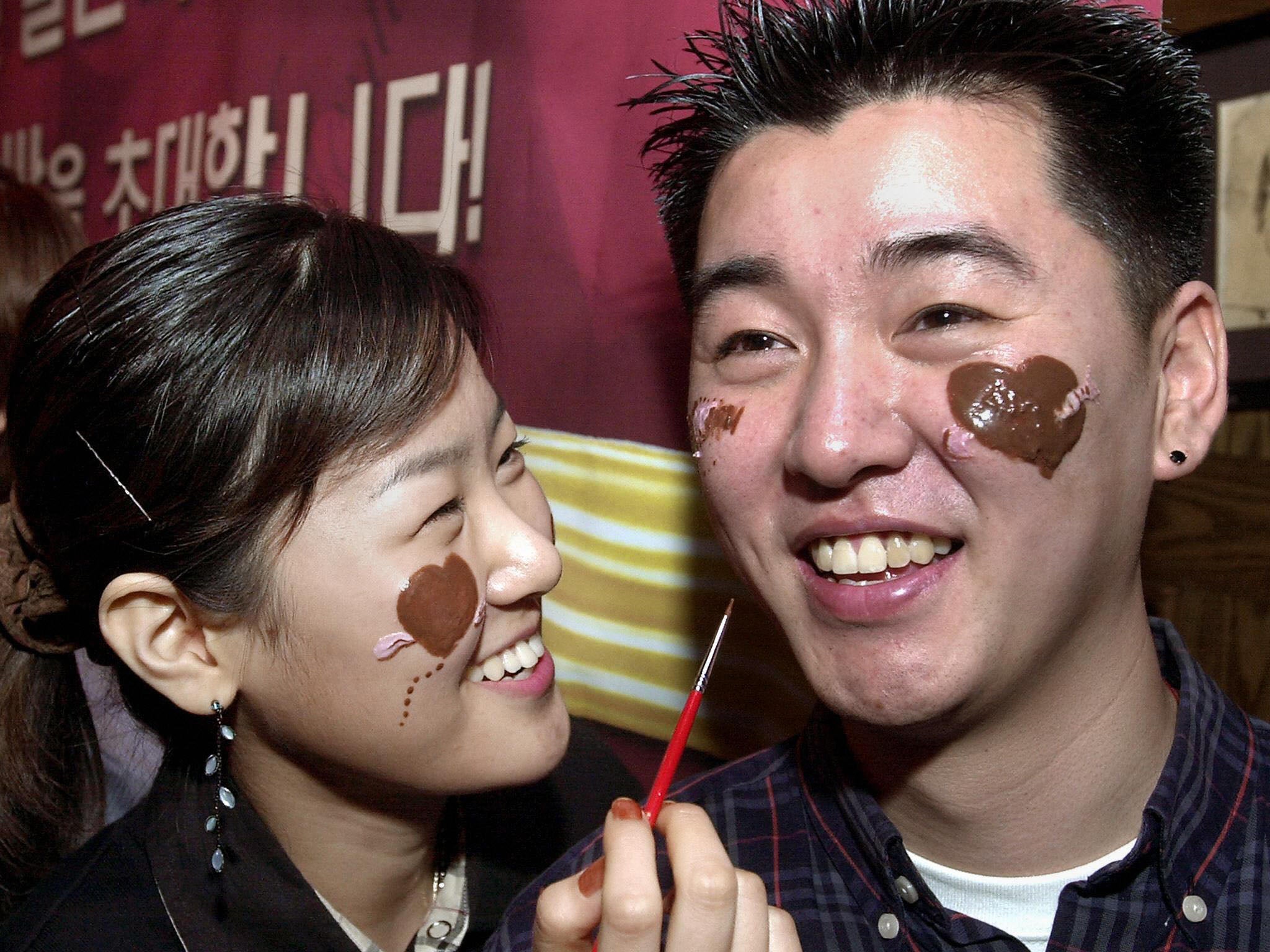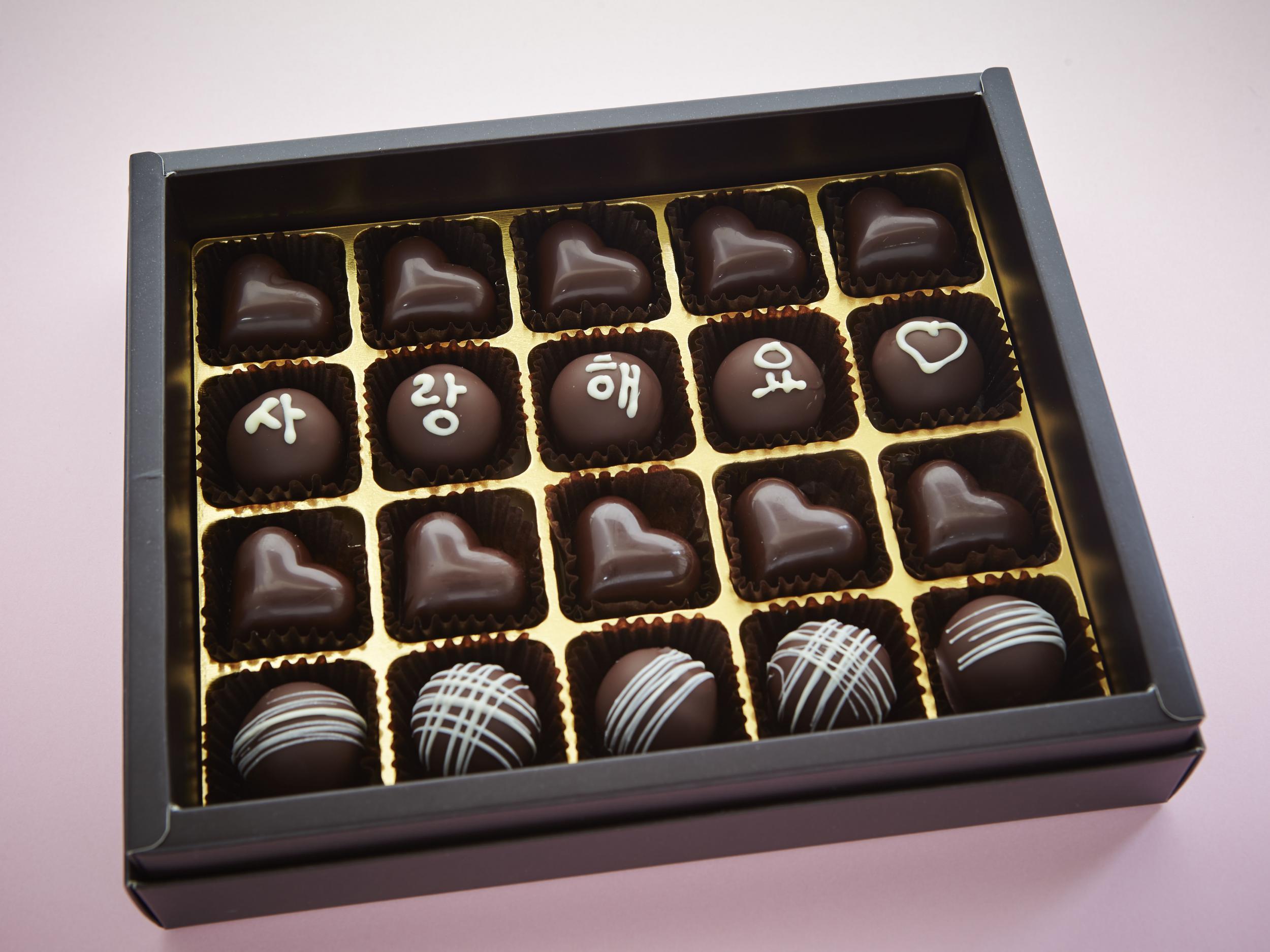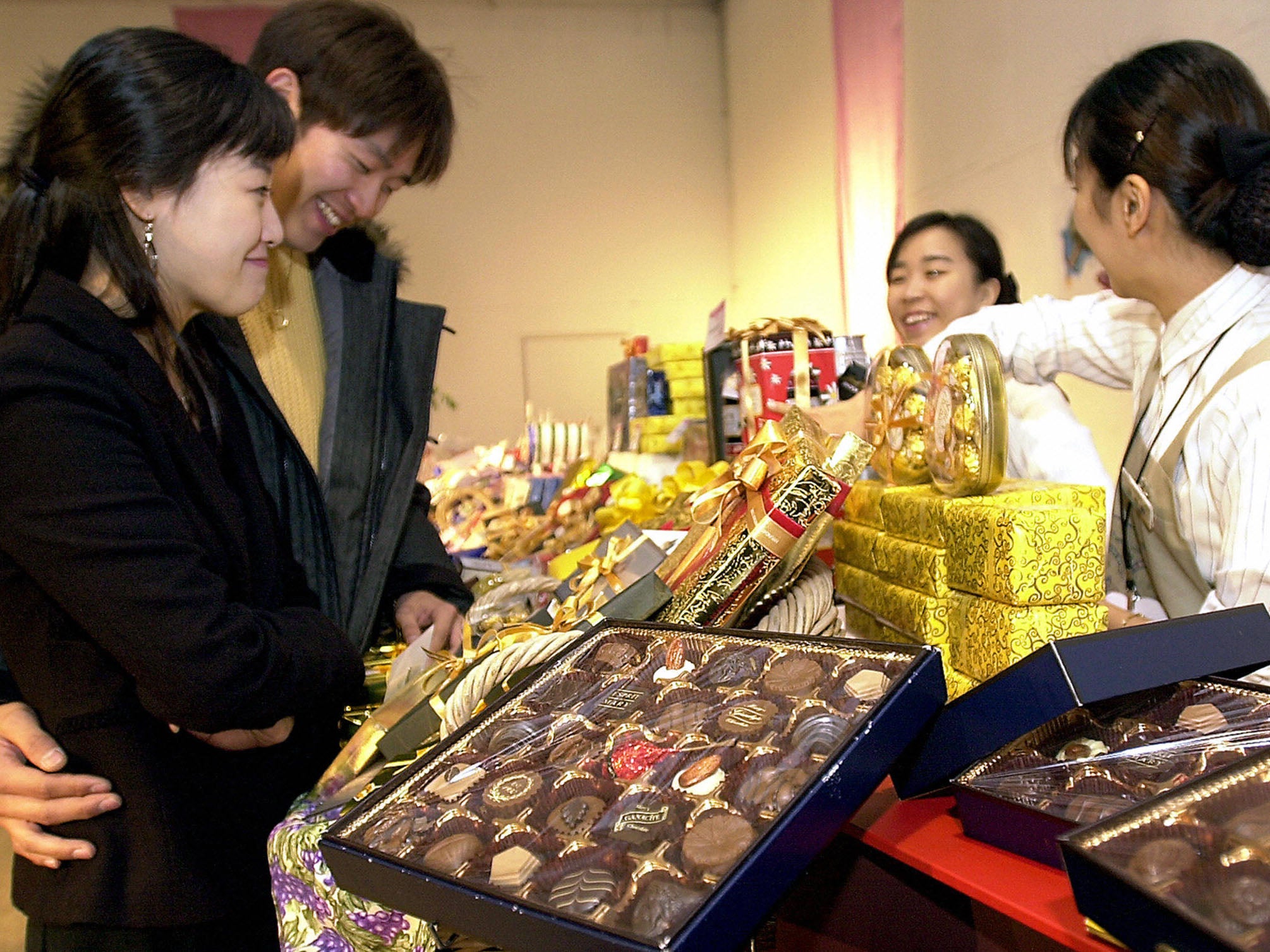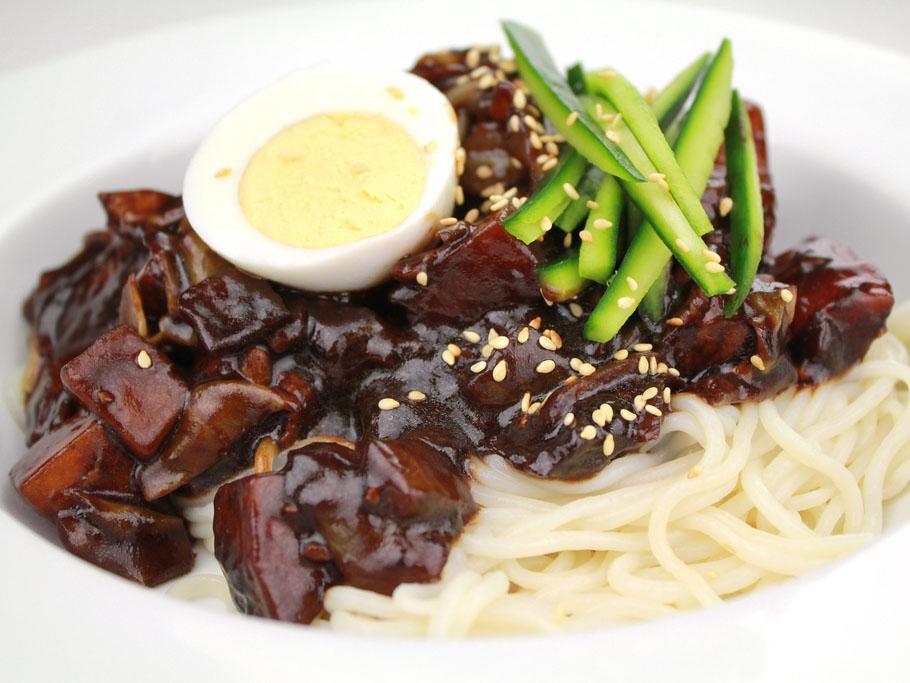From men to women and singletons, Valentine's Day happens every month in South Korea
Romantic rituals last for months, as women buy men chocolates, men buy women Chupa Chups and the singletons eat black noodles

Your support helps us to tell the story
From reproductive rights to climate change to Big Tech, The Independent is on the ground when the story is developing. Whether it's investigating the financials of Elon Musk's pro-Trump PAC or producing our latest documentary, 'The A Word', which shines a light on the American women fighting for reproductive rights, we know how important it is to parse out the facts from the messaging.
At such a critical moment in US history, we need reporters on the ground. Your donation allows us to keep sending journalists to speak to both sides of the story.
The Independent is trusted by Americans across the entire political spectrum. And unlike many other quality news outlets, we choose not to lock Americans out of our reporting and analysis with paywalls. We believe quality journalism should be available to everyone, paid for by those who can afford it.
Your support makes all the difference.The Winter Olympics are underway in Pyeongchang with the motto “Passion. Connected.” meanwhile, thousands of athletes from around the world will mingle on Valentine’s Day in that notorious hotbed of romance, the Olympic Village.
However, they might find Valentine’s traditions in South Korea very different to those celebrated in the West.
On 14 February, it’s not women who get showered with chocolates, fragrances and teddy bears – it’s the men. Across South Korea, women queue up to buy chocolate for their boyfriends but also friends, co-workers or even their boss. Most buy cheap and cheerful chocolate “ranging from the Korean brand Ghana Chocolate to Hershey’s and Ferrero Rocher,” says Korean Billy YouTube star Seong-Jae Kong from Seoul.

Others go to great effort “preparing for months and months before Valentine’s Day to give the guys something special,” says Mijoo, also from Seoul. It’s popular to hand-make chocolates and gift boxes for boys – often wonderfully kitsch – which Seong-Jae says “are the nicest Valentine’s gift because they’re the most meaningful”.
Women with serious won to spend head to artisan chocolatiers, such as Cacao Boom in Seoul. Here, handmade chocolates are infused with unique Korean ingredients, including the citrus fruit cheonhyehang or munbaeju, a distilled alcohol with the distinctive smell of wild pear and lovers can splash out on a Valentine’s Box of 48 chocolates for KRW130,000 (£86).
Meanwhile, over at the climate-controlled Piaf Artisan Chocolatier in Seoul, French-trained Ko Eun-su created a Valentine’s Day Limited Edition Package, which has sold out a week in advance. Retailing at KRW60,000 for just 16 chocolates, flavours include yuja citrus fruit and sweet mung bean with Moët Chandon Rosé.
It’s the women’s turn to be pampered on 14 March, known as White Day, or as Mijoo calls it “paying back day”. Instead of luxury chocolates though, girls receive candy or sweets from the guys. Although the value of the candy itself may be small, it’s the presentation that counts. “It’s about how much they can afford to wrap the candy beautifully or in a prettier way, for example they make a kind of flower bouquet out of lollipops,” explains Mijoo, with Chupa Chups the most popular White Day candy in South Korea according to CNN. “Men give jellies and caramels as well,” says Seong-Jae, “but they spend more on other White Day gifts like jewellery.”
For a romantic meal out, “people often go to a Western restaurant for a special occasion like Valentine’s day”, according to Hyojin An from Seoul, who has vlogged about South Korean culture on YouTube. Italian and upmarket steak restaurants are popular choices and it’s de rigueur for couples to put on a PDA, or public display of affection, by wearing matching clothes known as the “couple look”, designed to show off their romantic status.

But what about those dining alone? Black Day, 14 April, is unique to South Korea, when singletons supposedly wear black clothes and head mournfully to restaurants with friends to commiserate over jjajangmyeon black bean noodles. Originally a Chinese dish, the noodles are traditionally eaten on days of celebration in South Korea. “When I was growing up, on special days like birthdays or graduation you’d say, ‘Let’s get jjajangmyeon to celebrate!’” laughs Younhui from the city of Busan. “These days though people tend to go to restaurants like TGI Fridays instead.” Now the noodles are becoming associated more with sadness. On Black Day, the feeling is “let’s be sad together, let’s console each other together, because if you’re sad by yourself, you’re even more sad,” says Kyung-hwa on the YouTube channel Talk To Me In Korean. “I think, on Black Day, there are more guys than girls who sadly eat jjajangmyeon,” says Seong-Jae. But why black noodles? “Perhaps because black is seen as a sad colour, and jjajangmyeon is one of the only black-coloured meals,” ponders Mijoo.
Black Day seems to be an occasion that everyone jokes about, but no one owns up to participating in. Perhaps this isn’t surprising, as young people are under intense pressure to be part of a couple in South Korean society.
“People around me didn’t see my indifference to dating very kindly, as I, at 25, was reaching the ripe age for marriage. My family couldn’t get over the fact that I wasn’t seeing anyone,” Jieun Choi told Korea Exposé. Being single is highlighted further by the constant couples celebrations that mark the calendar. As well as Valentine’s Day, White Day and Black Day, there’s a “love day” on the 14th of every month of the year, including Yellow/Rose Day (14 May), Hug Day (14 December) and even Green Day (14 August) – interpreted by some as a time to commune with nature, and by others as an excuse to drink soju, literally “burned liquor”.
The distilled alcoholic drink is sold in distinctive green bottles and described by Psy, of Gangnam Style fame, as his “best friend” – it’s also the world’s best-selling spirit. “In Korea, there are lot of people who hate those celebration days for being too commercial, saying they were all made by business,” says Kyung-hwa.
It’s a feeling shared by many about the cynical commercialism which surrounds Valentine’s Day here in the UK, although maybe we should be thankful we only have to celebrate it one day a year. So if you’re single this Valentine’s Day or perhaps you don’t want to participate in an overpriced meal in the name of romance, you could always defiantly share some jjajangmyeon and a bottle of soju with friends. Why wait until Black or Green Day?

Recipe for jjajangmyeon (black bean noodles)
Serves 2
350g fresh jjajangmyeon noodles (you can get these in Korean supermarkets or substitute with udon or thick egg noodles)
5tbsp of roasted Korean black bean paste (jjajang)
200g pork loin
1 white onion
½ courgette
100g cabbage
½tsp grated ginger
2tbsp vegetable oil
1tsp of sugar
1tbsp mirin
250mls water or vegetable stock
1tbsp of corn starch dissolved in 50ml water
To garnish
Cucumber matchsticks
One boiled egg, cut in half
Cut the pork into small cubes and marinate with the mirin, ginger and seasoning to taste. Dice the onion and courgette and cabbage to the same size. Heat a tablespoon of oil in a large pan and stir fry the pork until almost cooked.
Add the vegetables and stir fry until soft, then add in the black bean paste and sugar and mix thoroughly. Pour in the water or stock and bring to a boil. Simmer for four minutes. Meanwhile, cook the noodles al dente according to the packet instructions.
Finally, add the corn starch to the black bean sauce and simmer briefly until it is thickened. Add a little more sugar to taste. Drain the noodles and divide into two serving bowls. Pour over the sauce and garnish with cucumber matchsticks and egg if desired.
Join our commenting forum
Join thought-provoking conversations, follow other Independent readers and see their replies
Comments